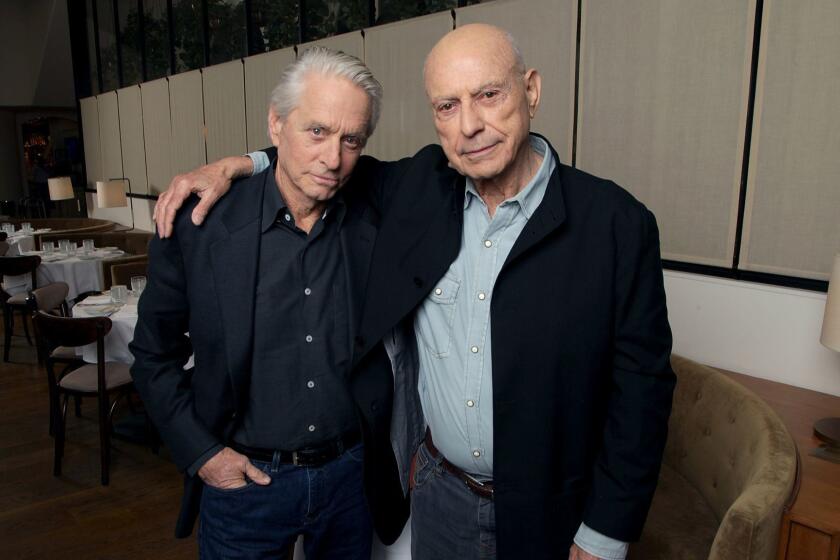Oscar winner Alan Arkin, seasoned trouper of ‘Little Miss Sunshine,’ dies
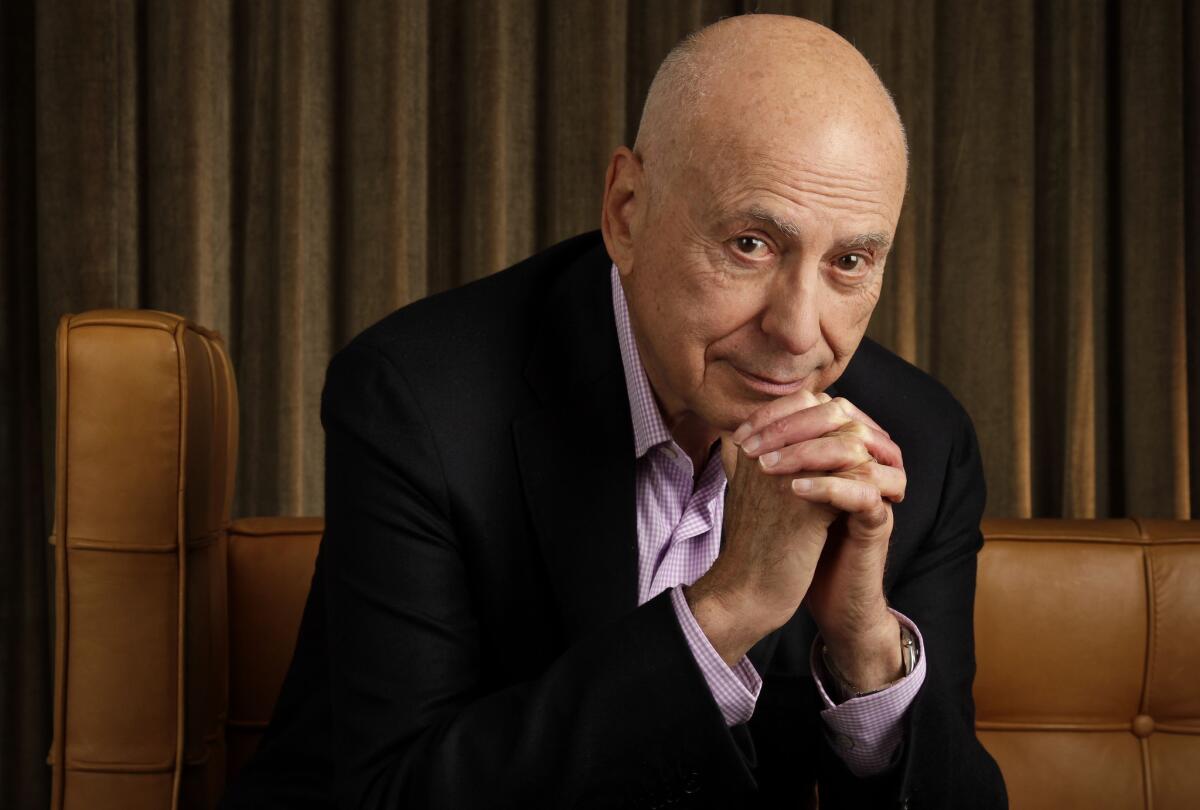
- Share via
Oscar winner Alan Arkin, whose background in improvisation and knack for comic drama were cornerstones of his extensive genre-hopping career that yielded enduring characters from the 1960s comedy “The Russians Are Coming, the Russians Are Coming” to “Little Miss Sunshine” and “Argo,” has died.
“Our father was a uniquely talented force of nature, both as an artist and a man. A loving husband, father, grand and great grandfather, he was adored and will be deeply missed,” the actor’s sons Adam, Matthew and Anthony said in a joint statement shared with The Times on Friday.
No additional details about his death were revealed. Arkin was 89.
Arkin’s wry wit and offhand performances brought realism to his work as he played his characters straight, making the droll moments more hilarious. Arkin added depth to the characters he played with elaborate costumes, makeup and quirky personality tics, delivering a fresh film nearly every year until late in life.
“Acting used to be torture, and if I didn’t do a scene well I felt as if I’d died. I never considered quitting acting, though — I couldn’t, because I was so shy that I needed it as a way of contacting people,” Arkin told The Times in 1998.
“My real vocation for several decades has been trying to find out who I am, and learn something about reality and consciousness,” he added. “That’s been my main work, and one of the results of this very long, slow process, is that acting’s become fun for me.”
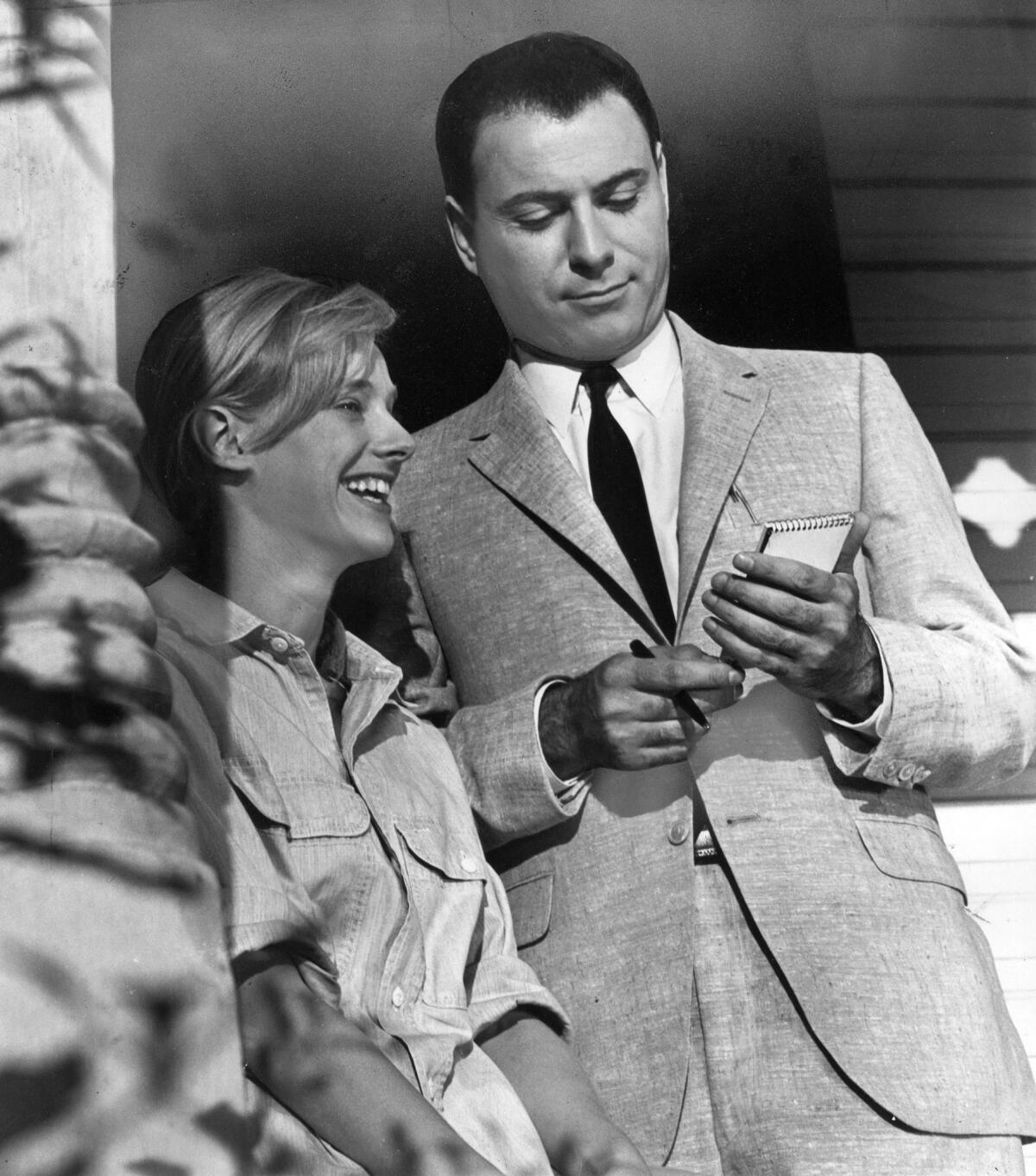
Arkin was nominated for four Academy Awards. He won a supporting actor Oscar playing a dysfunctional family’s foul-mouthed, drug-fueled patriarch in 2006’s “Little Miss Sunshine.” The actor witnessed the evolution of the film industry, which helped in his Oscar-nominated turn as a composited studio boss in 2013’s best picture winner “Argo.” (He said he based his character on legendary Warner Bros. executive Jack Warner.)
Versatile and adaptable, Arkin launched his career as a member of Chicago’s influential improvisational troupe, Second City. He won a Tony Award for his first Broadway play, Carl Reiner’s “Enter Laughing,” before making his film debut in the 1966 Cold War farce “The Russians Are Coming, the Russians Are Coming.” He earned a lead actor Oscar nomination and won a lead actor Golden Globe award for his role as the submarine commander in the film
He followed that up with the range-stretching role of an erudite psychopath stalking Audrey Hepburn in 1967’s “Wait Until Dark” and earned another Oscar nomination as a tragic deaf and mute man in 1968’s “The Heart Is a Lonely Hunter.”
Hollywood heavyweights Alan Arkin and Michael Douglas have more than a century of acting experience between them, but it took a Chuck Lorre sitcom to finally bring them together on screen.
As the years went by, Arkin seemed to work at a furious pace. He played the bumbling detective in “Inspector Clouseau,” inheriting the role from Peter Sellers after Sellers departed from the “Pink Panther” franchise. Arkin went on to appear in “Catch-22,” “The Seven-Per-Cent Solution,” “The In-Laws,” “St. Elsewhere,” “Edward Scissorhands,” “Grosse Pointe Blank,” “Gattaca” and “Slums of Beverly Hills” before winning his Oscar for “Little Miss Sunshine.”
In his later years, he perfected a reliably funny old codger persona in films such as “Grudge Match,” “Million Dollar Arm,” “Bojack Horseman” and “Going In Style” and in the Emmy-nominated Netflix comedy “The Kominsky Method.”
When “Argo” debuted at the Toronto International Film Festival in 2012, director Ben Affleck introduced Arkin as the “sweetest guy in the world even though he’s always playing the cranky guy with the heart of gold.”
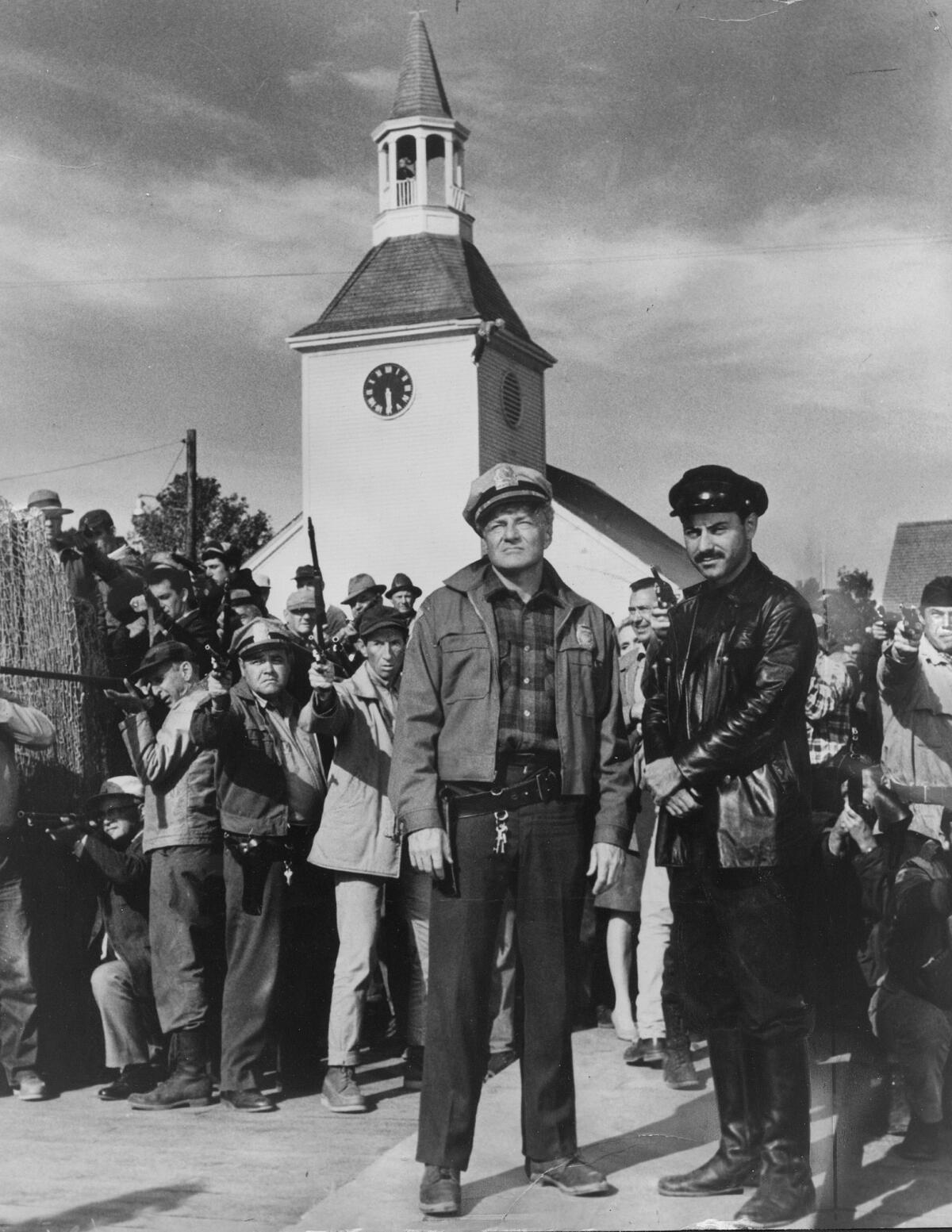
Arkin believed that the key to making people laugh was to approach silly with seriousness, which is what he did as he played a serviceman working out the insanity of warfare in “The Russians Are Coming, the Russians Are Coming” and “Catch-22”; a salesman surreptitiously moving his family around like nomads in 1998’s “Slums of Beverly Hills”; and a prosperous dentist reluctantly drawn into espionage in 1979’s odd-couple comedy “The In-Laws.”
“The more legitimate you make it, the funnier it is,” Arkin said in 2008. “I love insane, stupid comedy, but I can only make it work if it’s a character I can give some history to and make real. Like the guy I played in ‘Little Miss Sunshine.’ He’s a maniac, but to me, he was absolutely believable.”
Arkin spent much of his life feeling awkward, he said, desperately trying to become anyone but himself. When he first took up acting, it felt comfortable to become someone else or mimic another person’s mannerisms and motivations.
“I always considered myself a character actor,” he told The Times in 1991. “That’s what I always wanted to be. I always liked mustaches and hair and limps and nose pieces and accents.”
But later in life, his perspective changed and he became content to be himself. “I didn’t think I had any identity, so the further away I could go from anything resembling me, I thought, the more comfortable,” he explained in 2008 after his Oscar win. “Now it’s 180 degrees the other way. I don’t want to put on a costume, I don’t want to put on a wig or change my shape and voice.”
‘Argo’s’ Alan Arkin speaks to the power of subtle storytelling
In his 2011 memoir, “An Improvised Life,” Arkin wrote that “outside my life as an actor I had almost no life at all.” The book was among the half-dozen or so he published, including his 1979 autobiography “Halfway Through the Door,” several children’s books, science fiction stories and screenplays for short films. Away from the set, he enjoyed photography, playing jazz guitar and songwriting.
His small-screen work earned him four Emmy Award nominations, notably for 1967’s “ABC Stage 67,” the 2003 TV movie “The Pentagon Papers” and a guest role in “Chicago Hope,” the television series starring his son Adam. Arkin also headlined ABC’s short-lived madcap comedy “Harry” and appeared on “Sesame Street” with his second wife, Barbara Dana, in the early 1970s.
Alan Wolf Arkin was born on March 26, 1934, in New York City. His parents were teachers but his father was also a writer and painter. When Arkin was 5, he announced that he wanted to be an actor — a phase his father was certain he’d out outgrow.
“To decide on something at the age of 5 and stick to it comes from a very neurotic place; with me, that neurosis was rooted in the fact that the only time my parents paid attention to me was when I was performing,” Arkin told The Times.
Arkin said he was “a self-confident child” until he was about 8. That’s when his parents told him they were communists, a revelation that isolated Arkin and his two younger siblings from the outside world for much of their childhood. Arkin said he retreated into his imagination.
The family moved to Los Angeles’ Highland Park neighborhood in 1945 when his film composer uncle told Arkin’s father that he could get him a studio job painting sets. But as soon as they arrived there was a studio strike that lasted a year and a half. His father taught for a while, but the job vaporized during the Red Scare when those suspected of being sympathetic to communism were shunned and often blacklisted.
“The bottom basically fell out for our family when we moved here,” Arkin said. “We were dirt poor so I couldn’t afford to go to the movies too often, but I went whenever I could and focused in on movies as if they were more important than anything in life.”
In playing the Chief, head of the super-secret spy agency CONTROL in the new movie version of the classic spoof TV show “Get Smart,” Alan Arkin naturally endures his share of exasperation with the disaster-prone newbie Maxwell Smart (Steve Carell) under his wing.
He attended L.A. City College and then Cal State Los Angeles before earning a scholarship to Bennington College in Vermont where he was one of a handful of male students at what then was an almost exclusively girls’ school. There, he met his first wife, Jeremy Yaffe. He later married Dana, an actress, then Suzanne Newlander, a psychotherapist.
He scrounged for work as a part-time actor and singer. His folk band, the Tarriers, made a big-screen cameo in the 1957 film “Calypso Heat Wave” and achieved mild success with “The Banana Boat Song,” made famous by Harry Belafonte. Arkin launched his stage career in 1958 but had trouble breaking into New York theater.
“I was broke, so my marriage was falling apart, and at the age of 28 I was convinced nothing would ever happen to me,” he said.
Enter Paul Sills, the founder of Chicago’s Second City, who recruited Arkin to be an original member of the now-legendary improvisational company.
“I hold him totally responsible for whatever career I have,” Arkin said of Sills. “He was a maniac, he was impossible, but he was the heart and soul of the place.”
When Arkin finally made it to Broadway in 1963’s “Enter Laughing,” he earned glowing notices and a Tony Award. The following year he starred in Murray Schisgal’s “Luv,” directed by Mike Nichols, and eventually caught the eye of filmmaker Norman Jewison, who cast Arkin in “The Russians Are Coming, the Russians Are Coming.”
“He’s unique. He invented not acting,” said Nichols, who also directed Arkin in the 1970 war comedy “Catch-22.”
Jewison had a similar impression of Arkin’s remarkable ability to simply become another person.
“Alan’s never had an identifiable screen personality because he just disappears into his characters,” said Jewison. “His accents are impeccable, and he’s even able to change his look — but oddly enough, this gift has worked against him. He’s always been underestimated, partly because he’s never been in service of his own success, which is one of the things I love about him.”
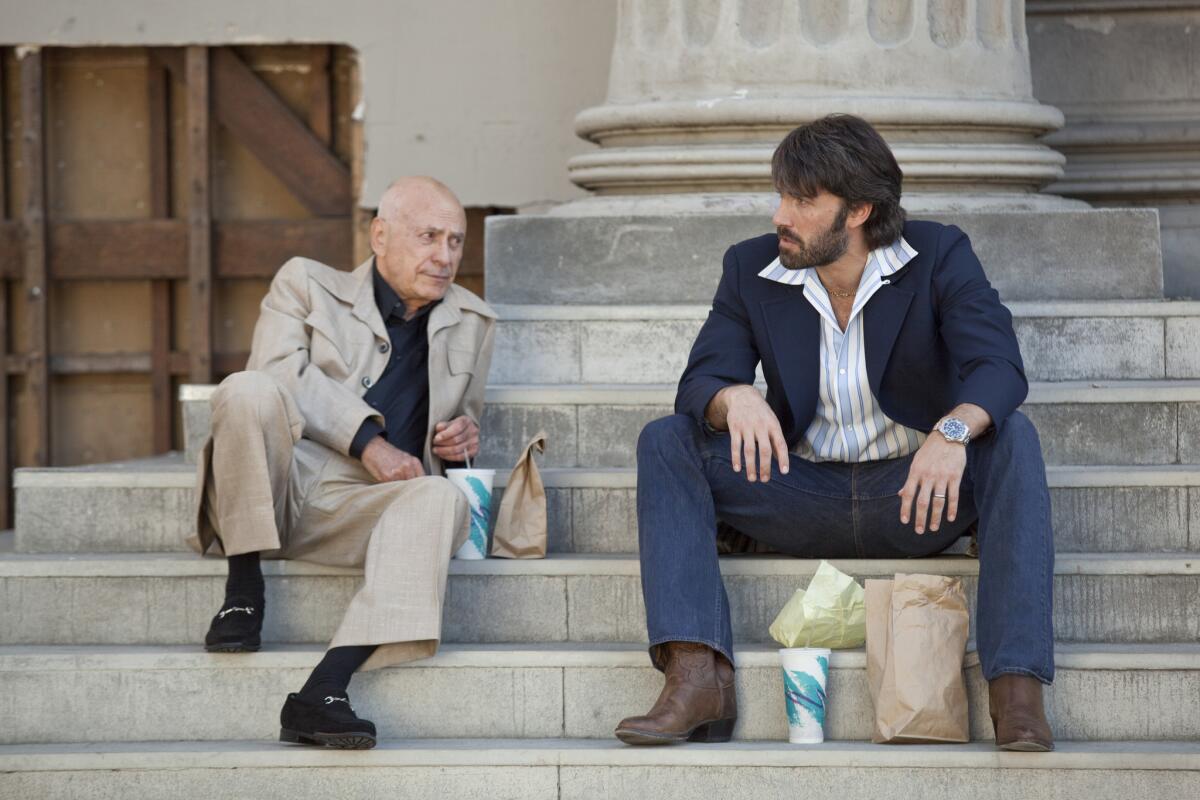
When he turned 80, Arkin — by then a longtime San Diego resident — was presented with the San Diego Film Festival’s inaugural Gregory Peck Award and said he wasn’t ready to retire.
“Almost everybody I know who has done anything creative has a restlessness about them,” he said. “There’s another mountain they haven’t climbed yet. That’s certainly very much the way I feel.”
Arkin is survived by his wife Suzanne and three sons, Adam, Matthew and Anthony; grandchildren Molly, Emmet, Atticus and Abigail, and great grandson Elliott.
Times staff writer Alexandra Del Rosario contributed to this report.
More to Read
Only good movies
Get the Indie Focus newsletter, Mark Olsen's weekly guide to the world of cinema.
You may occasionally receive promotional content from the Los Angeles Times.
